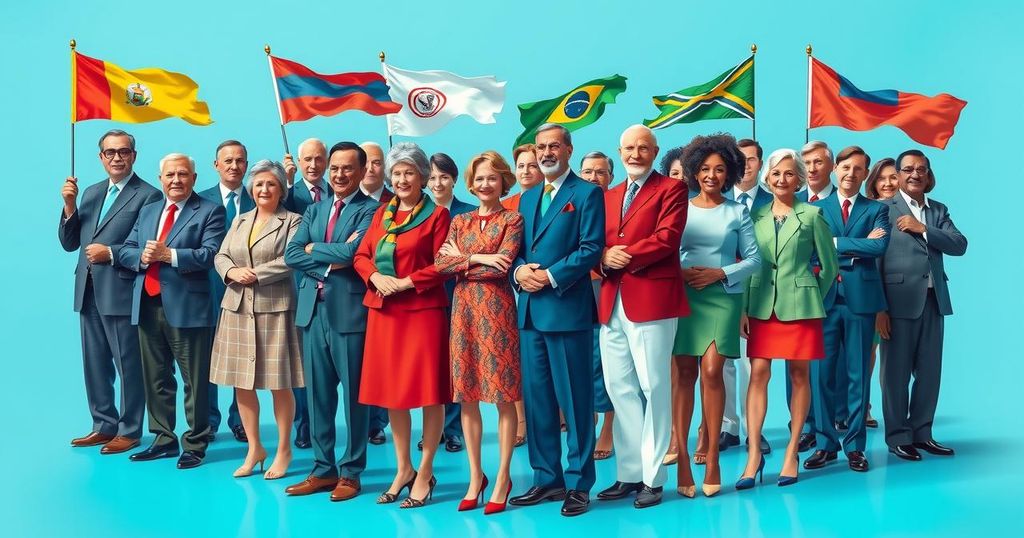World news
AMERICA, ASIA, CANADA, CH, CHRYSTIA FREELAND, CLAUDIA SHEINBAUM, COLOMBIA, CONSERVATIVE, CONSERVATIVE PARTY, CUBA, ELECTION, EUROPE, FEN, FRANCE, GOVERNMENT, IRAN, LIBERAL PARTY, NORTH AMERICA, PARLIAMENTARY SEATS, POLITICS, PRESIDENTIAL CANDIDATES, PRESIDENTIAL ELECTIONS, SOUTH AMERICA, TRUDEAU, UKRAINE, UNITED STATES, US, YEMEN
Jamal Robinson
0 Comments
How Trump’s Diplomacy Is Influencing Global Leaders’ Popularity at Home
This article explores how former President Donald Trump’s interactions with world leaders like Justin Trudeau, Claudia Sheinbaum, and Volodymyr Zelenskyy have inadvertently boosted their domestic approval ratings through diplomatic negotiations and public positioning against his administration’s policies.
The influence of former President Donald Trump extends beyond U.S. borders, notably helping other world leaders enhance their domestic popularity amid contentious negotiations. Leaders like Canadian Prime Minister Justin Trudeau, Mexican President Claudia Sheinbaum, and Ukrainian President Volodymyr Zelenskyy have reported improved approval ratings, with some experts attributing this rise to their engagement with Trump’s administration. Trump’s often combative international stance has inadvertently provided these leaders with the opportunity to strengthen their political standing at home.
In Canada, Prime Minister Justin Trudeau has experienced a significant rebound in his approval ratings after a challenging period characterized by rising living costs and mounting political pressure. Following aggressive tariff threats from Trump, Trudeau adopted a firmer public stance, asserting, “Canadians are reasonable, and we are polite. But we will not back down from a fight.” Recent polls show the Canadian Liberal Party has narrowed the gap with the Conservative Party, reflecting a shift in public sentiment.
Mexican President Claudia Sheinbaum, the first female leader of Mexico, has also witnessed a surge in approval rates after adopting a strategic approach to Trump’s tariff threats. While opinions about the U.S.-Mexico relationship are mixed, with some citizens acknowledging a strained dynamic, Sheinbaum’s decisive actions have garnered significant public support. Polls indicate that her approval rating reached 85 percent, the highest in 30 years for a Mexican president, demonstrating her ability to navigate tough negotiations effectively.
Ukrainian President Volodymyr Zelenskyy has similarly benefitted from his interactions with Trump. Despite tensions following Trump’s controversial statements and the suspension of military aid, a recent poll showed a noticeable increase in Zelenskyy’s approval ratings amid renewed U.S. support and a ceasefire agreement. Analysts suggest that the perception of U.S. rhetoric as a unified attack has rallied Ukrainian support around Zelenskyy, boosting his domestic popularity.
Meanwhile, international leaders such as British Prime Minister Keir Starmer and French President Emmanuel Macron are reaping benefits from their diplomatic engagements with Trump. Starmer’s approval ratings improved following strategic decisions made during the ongoing Ukraine conflict, positioning himself as a capable leader amid adversity. Macron’s handling of international crises, particularly regarding Trump, has also enabled him to secure a rise in public approval, as evidenced by recent surveys.
In summary, while Trump’s confrontational diplomacy has often put strain on international relations, it has paradoxically allowed various world leaders to bolster their domestic approval ratings. Leaders like Trudeau, Sheinbaum, Zelenskyy, Starmer, and Macron have leveraged these situations effectively, demonstrating that political dynamics can be influenced by the actions of global powers such as the United States.
The article illustrates how Donald Trump’s contentious interactions with world leaders have had the unintended effect of bolstering their approval ratings domestically. Political figures such as Trudeau, Sheinbaum, and Zelenskyy have effectively used their engagements with Trump’s administration to strengthen their position, resulting in significant gains in public support. This phenomenon underscores the complex interplay between domestic politics and international diplomacy, revealing how global leadership can shape local perceptions and opinions.
Original Source: www.aljazeera.com




Post Comment